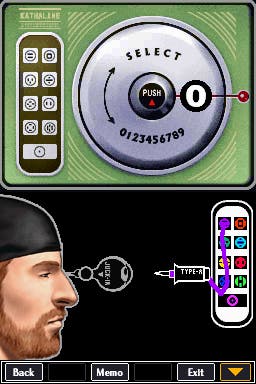Flower, Sun and Rain
The dating game.
Sumio Mondo has a 1970s Toyota Celica and a briefcase he calls Catherine. He plugs Catherine into things - in the first instance, a bus driver's eye socket - and uses her to dial in combination numbers, as if cracking a safe, or using an old telephone. In this way, the mysteries of life are unlocked. Or the mysteries of Lospass island, at any rate - its enigmatic hotel, its bizarre inhabitants, and the endlessly time-looped aircraft explosion in its sky.
Like its creator Suda 51, Flower, Sun and Rain gives an initial impression of pretension that soon melts away under the warmth of its mischievous, self-deprecating sense of the absurd, and its willingness to take risks. Like the man himself, that makes it hard to dislike - initially. But Flower, Sun and Rain was first released for the PS2 in 2001, in Japanese only, and it probably seemed anachronistic even then. It's stuck in a time-warp of its own, re-enacting a pedantic and detached cul-de-sac of adventure game design that, mercifully, never actually happened.
Mondo, a "searcher" and finder of lost things, arrives on Lospass at the behest of Edo Macallister, manager of the Flower, Sun and Rain, the island's only hotel. Macallister, a grinning cypher in a sailor suit who seems to have stepped into the game from a warped Broadway musical, wants Mondo to solve the island's Groundhog Day problem. Every day is a repetition of the last, ending abruptly with a terrorist bomb destroying a plane high over the island, and beginning with Mondo waking groggy and fully clothed on his bed.

Mondo proceeds to unravel this most odd mystery in the time-honoured manner of the videogame detective. He walks around looking for objects he can examine; stumbles across arbitrary obstacles blocking the path of logic (or least resistance); talks to a surreal supporting cast of variously quixotic, funny and plain incomprehensible characters; gleans clues, solves riddles and - eventually, inevitably - helps people find what they've lost, whether it's a football-shaped handbag or a sense of self-belief.
There's a lot of fetch-and-carry, talk-and-unlock makework involved in inching the game's one day forward, step by step. In a narrative sense, this ought to be irritating. Much of it is (or at least seems) irrelevant to the plot's main thread, and many of the detours are absurdly forced - must we really help a professional wrester in a suit and tie recover his lost form, instead of simply stepping around him to get to the floor below? And what exactly is this interlude with the small girl looking for Chris the pink crocodile all about?
That said, as far as the game's story is concerned, this isn't a problem at all; it meshes perfectly with Flower, Sun and Rain's twisted dream logic. To begin with, Mondo is simply trying to reach the hotel lobby for breakfast, but he's repeatedly thwarted, diverted or distracted by the guests' bizarre demands, waking up, and trying again. It's exactly like a dream. Unfortunately - despite the entertaining supporting cast and Suda 51's snappy, surreal and passionately detailed dialogue - it's a bad one.


